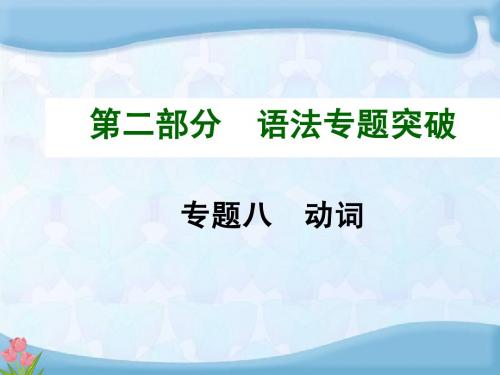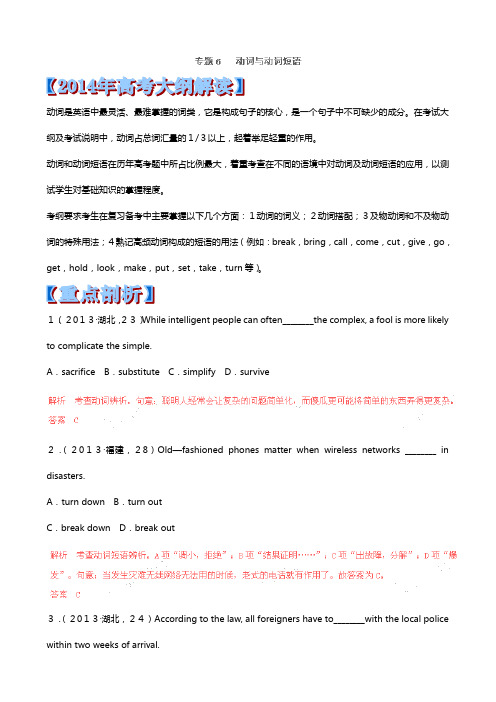专题突破8 动词和动词短语
动词(共55张PPT)

表示状态的系动 表示主语所处的状
词 态
be
表示持续的系动 表示主语继续或保 词 持某种身份或状态
keep; remain;
stay;
lie
stand;
类别 表示感官的 系动词
功能
例词
look; feel;
表示人体感官的动作 smell; taste; sound
表 示 状 态 变 表示主语从一种状态 become; get; 化的系动词 变换到另一种状态 go; grow; turn
【解析】考查动词短语辨析。句意为:当你参观
博物馆时你应该 ____ 指示并且不要违反它们。
compare with比较;look forward to期望;pay
attention to注意;try out试验。将选项代入语境
进行分析可知只有C项符合。故选C。
第三节 情态动词
考点精讲
could:2012 年黔东南州 38 题考查; must: 近 4 年共考 查3次;have to:2012年遵义30题考查,2011年安顺30 近4年共考查4次;need:近4年共考查6次) 情态动词本身有一定的意义,但不能独立作谓
得好。 The little girl is singing an English song. 小女孩正 在唱一首英文歌。
(3)易混淆的近义动词辨析
① watch, look, see与 read (见第一部分课时七
(上)Units 1-2) ②speak, tell, talk 与 say ( 见第一部分课时七 (下)Unit 5) ③pay, spend, cost 与 take ( 见第一部分课时七
选C。
3.I___an article about first aid. It’s
人教版中考语法专题突破课件专题8动词

现在进行时态
助动词
功能
例句
do
构成疑问句、 Do you come from Japan?你 否定句 来自日本吗?
加强语气
Do be careful! 小心点!
助动词
功能
例句 He could dance as well as
do
代替主要动词 he did before.他舞跳得和
从前一样好。
构成否定祈使 Don’t smoke here!不要在
表示状态变化 表示主语从一种状态
的系动词
变换到另一种状态
grow, turn
特别提醒: ①一般情况下,系动词没有被动语态形式。 ②表示状态的系动词一般不用于进行时 (feel 除
外);变化系动词表示“渐渐„„”,可用于进行
时。如:It’s getting warmer and warmer.天气渐 渐变得暖和。
【解析】考查动词词义辨析。句意:我将与简在 车站见面,请她 到的时间。count数数;
choose 选择; check 核对; catch 赶上。将选项分
别带入语境进行分析,故选C。
3. Her uncle telephoned and asked her if she had _____the birthday gift from him. A. invented C. received B. raised D. ordered
背诵记忆。具体如下:
◆不同动词+同一介词 (2014年考查2次,2013年30
题,2012年27题,2010年30题)
on短语
try on试穿 turn on打开 take away 拿走 move away 移动 pick up 捡起 turn up出现
2015年中考英语(安徽,外研版)语法专题突破 专题八 动词(共63张PPT)

stay, stand, lie
look, feel, smell, taste, sound
表示感官 表示人体感官的系动词
表示状态 变化表示主语从一种状 become, get , go, 变化 态变换到另一种状态 grow, turn
注意:感官动词后常跟形容词作表语。
现学现用 1. In China, we shouldn’t p ____ oint (指)at anyone with our chopsticks.
考点二
系动词的用法
系动词本身没有词义,不能单独作谓语,必须
和表语一起构成谓语,说明主语的状态、性质、特 征或身份。 ◆常考系动词的分类 类别 功能 例词 am, is, are,
表示状态 表示主语所处的状态
was, were
类别
表示持续
功能
例词
表示主语继续或保持某 keep, remain,
种身份或状态
be dead be in be on be over wear
2.实义动词中常见易混近义词辨析 ① borrow, lend 与 keep ( 见第一部分课时九(上)
Modules 7-9)
② expect, wish, hope与look forward to(见第一部分 课时八(下)Modules 5-7) ③ discover, create, invent, find与find out(见第一部分 课时八(下)Module 5-7)
④ hear, listen与sound(见第一部分课时七(下)
Modules 11-12) ⑤ watch, look, see与read(见第一部分课时七(上) Modules 9-10) ⑥ receive 与 accept ( 见第一部分课时七 (下) Modules 5-6)
解析版高考英语难点专题 动词与动词短语

动词是英语中最灵活、最难掌握的词类,它是构成句子的核心,是一个句子中不可缺少的成分。
在考试大纲及考试说明中,动词占总词汇量的1/3以上,起着举足轻重的作用。
动词和动词短语在历年高考题中所占比例最大,着重考查在不同的语境中对动词及动词短语的应用,以测试学生对基础知识的掌握程度。
考纲要求考生在复习备考中主要掌握以下几个方面:1动词的词义;2动词搭配;3及物动词和不及物动词的特殊用法;4熟记高频动词构成的短语的用法(例如:break,bring,call,come,cut,give,go,get,hold,look,make,put,set,take,turn等)。
1.(2013·湖北,23)While intelligent people can often________the complex, a fool is more likely to complicate the simple.A.sacrifice B.substitute C.simplify D.survive2.(2013·福建,28)Old—fashioned phones matter when wireless networks ________ in disasters.A.turn down B.turn outC.break down D.break out3.(2013·湖北,24)According to the law, all foreigners have to________with the local police within two weeks of arrival.A.associate B.dispute C.negotiate D.register4.(2013·江苏,23)—The town is so beautiful! I just love it.—Me too.The character of the town is well ________.A.qualified B.preservedC.decorated D.simplified5.(2013·江苏,29)T eam leaders must ensure that all members ________ their natural desire to avoid the embarrassment associated with making mistakes.A.get over B.look overC.take over D.come over6.(2013·陕西,25)My uncle hasn't been able to quit smoking,but at least he has ________. A.cut out B.cut downC.cut up D.cut off7.(2013·天津,2)If you are in trouble,Mike is always willing to________a hanD.A.lend B.shake C.wave D.want8.(2013·新课标Ⅰ,23)Try not to cough more than you can________since it may cause problems to your lungs.A.check B.allow C.stop D.help9.(2013·浙江,9)When the group discussion is nearing its end,make sure to ________ it with important points.A.conclude B.lead C.avoid D.hold10.(2013·浙江,12)A good listener takes part in the conversation,________ ideas and raising questions to keep the talk flowing.A.realizing B.copyingC.offering D.misunderstanding考点1、动词意义的辨析【例1】Recently,these companies have ________ some workers becames of the drop in economy. A.hired B.dismissed C.refused D.employed【例2】When his brother was to cross the street,he was knocked down by a truck and badly ________.A.injured B.damaged C.harmed D.destroyed考点2、动词的固定搭配【例3】I ________ it as a basic principle of the company that suppliers of raw materials should be given a fair price for their products.A.make B.look C.take D.think【例4】Her shoes ________ her dress,they look very well together.A.suit B.fit C.compare D.match【特别提醒】英语中一些动词虽然词形相近,但意义不同(1)动词adapt, adjust, adopt的用法比较。
2020年人教版初中英语基础语法 (八升九) 暑假专题突破与巩固 学案(八):动词的时态和语态篇

人教版初中英语基础语法暑假专题突破与巩固学案(八)基础语法专题:动词的时态和语态篇第一部分:定义概念清晰化动词的时态: 指的是谓语动词用来表示动作或情况发生时的各种动词形式。
英语中一共有16种时态,但在初中阶段常考的时态有以下8种:一般现在时、一般过去时、一般将来时、现在进行时、过去进行时、现在完成时、现在完成进行时、过去完成时。
考查重点集中在一般现在时在条件状语从句和时间状语从句中的用法、终止性动词在现在完成时中不能与for,since短语或从句连用、have been to与have gone to的用法以及在具体语境中动词的用法等。
动词的语态: 指的是表示句子主语与谓语动词之间关系的一种动词形式。
英语中的动词语态有两种:主动语态和被动语态。
主动语态表示的主语是动作的执行者或发出者,被动语态表示的主语是动作的承受者。
被动语态是中考中的必考内容之一,其中考查的重点是一般现在时、一般过去时和含有情态动词的被动语态。
第二部分:知识归类知识网络化We’ll have a picnic if it is fine next Sunday.如果下个星期日天气晴朗,我们将去野餐。
I’ll call you as soon as I get to Beijing tomorrow.我明天一到北京就给你打电话。
2.某些表示起始、往返、出发、到达之意的动词,可用一般现在时表示按规定、计划或安排将要发生的动作(此时一般都有一个表示未来时间的状语)。
这类动词有:begin, come, go, leave, start, arrive, end, stop, open, close等。
如:The meeting begins at 2:00 p.m. tomorrow.这个会议明天下午2点开始。
The next train leaves at 7 o’clock this evening.下一列火车将在今晚7点离开。
2015年山西中考英语专题突破专题八专题八 动词 第二节 动词短语

C 3.We’ll ________ different mountain villages for a survey about basic education next month. A.look for B. pay for C. leave for
【 解析 】考查动词短语辨析。句意为:下 个月,我们将 ______ 不同的山村调查基础 教育。look for 寻找;pay for 付款; leave for 动身前往。 根据语境可知是“动身”, 故选C。
现学现用 C 1. Please _______ the water when you brush your teeth. We should learn to save water. A.turn down B. turn out C. turn off
【 解析 】考查动词短语辨析。句意为“你 刷牙时,请 _____ 水龙头,我们应该学着 节约用水。”turn down调小;turn out证 明是;turn off关掉。根据句意,C项符合, 故选C。
第二部分 语法专题突破
专题八
第二节
动词
动词短语
考点精析
分析近 7 年山西中考对动词短语的考查可以 看出动词短语的考查除 2009 年和 2012 年都考过 make短语之外,其他均不重复,而涉及的词汇也没 有生难词。主要考查学生的语境理解能力。在句 式结构上以单句为主。此处对常见的动词短语进 行列举,方便学生记忆。对于未涉及的短语, 老师
4. Anna is going on a tour of Xi’an, and she wants to ______ Chinese history. B A.dream of B. learn about C. look through
最新中考英语语法练习题目专题8[动词及动词短语]
语法专题突破专题八动词及动词短语(限时:25分钟满分:51分得分:________)Ⅰ.选择填空(每小题1分)1. (2019安徽改编)—Hello, Beijing Hotel. Can I help you?—Yes, I’d like to ________ a single room for two nights.A. enterB. moveC. book2. (2019连云港改编)Through the stories behind the idioms, we would be able to fully ________ China’s culture, history and tradition.A. understandB. searchC. compare3. (2019无锡改编)—I’m going to add some tomato sauce to the salad, if you don’t ________.—Not at all. Go ahead.A. careB. agreeC. mind4. (2019包头改编)Stephen Hawking has ________ great success as a scientist.A. allowedB. achievedC. practiced5. (2019贵港改编)—Joe, don’t eat too much ice-cream.—OK, mom. But it ________ really good.A. feelsB. looksC. tastes6. (2019铁岭改编)The cover of the book ________ comfortable. It’s made of silk.A. tastesB. feelsC. looks7. (2019滨州改编)—Tom,________ the umbrella with you.Look at the dark sky, it’s going to rain.—Thank you, dad.A. takeB. wearC. use8. (2019岳阳)The volunteers________ the sick kids in the hospital on weekends.A. look afterB. look forC. look through9. (2019宜宾)In the face of difficulty, never ________ and you will succeed sooner or later.A. give backB. give inC. give away10. (2019咸宁改编)—Jimmy, the books are everywhere in your study.—Sorry, Mom. I’ll ________ at once.A. put them onB. put them awayC. put them out11.(2019安顺改编)—I don’t think teachers should give too much homework to ________ the free time of students.—Exactly!A. give upB. take upC. look up12. (2019黄冈改编)—I don’t know how to ________ the old books.—Why not give them away to poor children?A. hand outB. give upC. deal with13.Everyone is born with the ability to ________. However, whether we can do well or not depends on our learning habits.A. playB. smileC. learn14. Please follow the rules. Don’t take photos or ________ anything shown in the museum.A. buyB. touchC. watch15. The mother always sets a good example for her children and wants them to ________ her.A. followB. praiseC. answer16. I will be glad if you can ________ time to have a visit to our hometown.A. missB. changeC. spare17.—The school net will be shut down for safety reasons.—That doesn’t ________ me at all. I’m not a net-worm, anyway.A.fitB. satisfyC. worry18.—I’ve tried hard at my schoolwork but still ________.—Don’t be upset. Sometimes losing is only a sign that you really tried.A. failedB. worriedC. improved19.—How’s Peter now? I haven’t seen him for a long time.—I heard the company ________ him a very good job, but he turned it down.A. trainedB. encouragedC. offered20. It is important for us to ________ trade with foreign countries, because it will bring us more chances.A. changeB. developC. thank21.—Would you like to see a movie with me on Saturday night?—Sorry, I didn’t ________ it. Could you please say it again?A. receiveB. catchC. finish22. I ________ Joe’s invitation yesterday. I am thinking about whether I will go there or not.A. receivedB. acceptedC. offered23. Yesterday I ________ a book about cooking in the bookstore. I want to learn a new skill.A. boughtB. soldC. heard24. It is so lucky that I ________ the game. I just can’t believe it.A. wonB. enteredC. passed25. I ________ my English dictionary to Tom. And he promised to give it back tomorrow morning.A. lentB. broughtC. lost26. There are so many fish swimming in the pool. They ________ very happy.A. tasteB. smellC. look27.—Do you like having food with music?—Yes. I like soft music. It ________ nice.A. tastesB. looksC. sounds28. Please ________ your rubbish with you when you leave your seat. Don’t throw away the rubbish everywhere.A. bringB. carryC. take29. A smile is helpful. It can help me ________ hard times in life.A. get upB. get throughC. get out30. The government has ________ to stop air pollution, such as controlling the traffic and shutting down certain factories.A. taken actionB. taken placeC. taken care31. Before you start to read a new book, you’d better ________ its background first.A. look outB. look aroundC. look through32.—Could you please drive faster, sir? My flight to Kunming is going to ________.—I want to, but safety comes first, after all.A. get offB. shut offC. take off33. You’d better try to guess the meaning when you meet a new word. Don’t always ________ your dictionary.A. keep onB. depend onC. decide on34. We’re not supposed to ________ those who failed, because no one can be a winner all the time.A. point atB. laugh atC. look at35. Summer camp is a great experience for students. It is good to help them ________.A. fix upB. send upC. grow up36.In a soccer game, it’s important for players to play together and________ the best in each other.A. hang outB. check outC. bring out37. I like reading, and I buy the magazines when they ________ every month.A. take outB. come outC. find out38. Our geography teacher told us to ________ more information about our city and share it next week.A. find outB. keep awayC. turn offⅡ.短文填空基础训练(每小题1分)音标1.When I was young, I ________/θɔːt/ being a pilot was the coolest job in the world.2.When you meet some difficulties, you should face them bravely and ________ /traɪ/ to get them over by yourself.3. Mary gave me several useful suggestions on how to ________ /ɪm’pruːv/ my listening skills. How kind she was!4. As the autumn comes, most of the leaves turn yellow and ________ /fɔːl/ down from the trees.5. My parents don’t allow me to read e-book s. They ________ /′wʌri/ about my eyes.6. On February 10th, 2017, Wang Yuan ________ /meɪd/ a short speech on good quality education of English in the United Nations.7. When the baby dog was found, it was very hungry. So we ________/ɡeɪv/ it some food.适当形式填空8. (2019绥化)It’s ________(say) that the pianist will come to our city next week.9. (2019大庆)In many restaurants, tea is ________(serve) for free.10. (2019宿迁)The question is a little difficult. Let’s have a ________ (discuss) about it.11. (2019鄂州)There are some boys ________ (swim) in the river now. It’s very dangerous.12. Traditional customs, beliefs, or methods are ones that have existed for a long time without ________(change).13. Please stop ________ (waste)your time on mobile phones. There are more meaningful things for you to do.。
专题8 动词和动词短语
一种状态
grow, turn
表示主语已经终止某动作
prove, turn out
专题八 动词和动词短语
◆及时练 feel look smell sound taste seem go keep remain turn
18.Most of the house remains good even after two hundred years. 19.Trees turn green and flowers begin to come out. 20.As things stand at present, he seems certain to win.
态,shall 用于第一 要去日本。
人称,will 用于各种 They will meet me at the airport.
人称
他们会在机场接我。
专题八 动词和动词短语
助动词
should/ would
功能
例句
构成过去将来时 He said he would never see you again
可用于现在完成时的否定式中,成 3 weeks. 为可以持续的状态,因而可以与表 我已经 3 个星期没有他的消
息了。 示时间段的时间状语连用。
专题八 动词和动词短语
延续性动词与非延续性动词之间的转换: leave→be away, borrow→keep, buy→have, begin/start→be on, die→be dead, finish→be over, join→be in+组织机构名 →be a member of+组织机构名,
专题八 动词和动词短语
(三)助动词
助动词本身没有意义或意义不完全,不能单独用作谓语。助动词在句
八年级上册英语期末高频考点专题突破(人教版)Unit8 SectionA
Unit8 SectionA知识讲解1. Turn on the blender. 打开食物搅拌器。
turn on意为"打开",反义词组是turn off。
turn up意为"开大",turn down 意为"关小",都是"动词+副词"构成的短语,后接代词作宾语时,该代词要位于副词之前。
若后接名词作宾语,则该名词位于副词前后都可以。
2. Cut up the bananas. 切碎香蕉。
cut up切碎,切开,相当于cut into pieces,cut up属于"动词+副词"构成的短语,接代词it/them时要放在cut up中间,接名词时放后边和中间都可以。
3. Pour the milk int o the blender. 把牛奶倒进食物搅拌器里。
(1)pour…into…意为“将……倒进……里”。
(2)pour用作动词,意为“倒出;倾倒”。
pour sth. for sb. “给某人倒某物”。
4. Peel three bananas. 剥三个香蕉。
peel 此处用作及物动词,意为“剥皮;去皮”。
5. How do you make a banana milk shake? 你怎样做香蕉奶昔?(1)这是一个特殊疑问句,疑问词how意为“怎样;如何”,用以对做某事的方法、方式、途径及动作成都等进行提问。
(2)make在此用作及物动词,意为“做,制作”,其后常接双宾语,即make sb. sth.,可与make sth. for sb.进行同义句转换,意为“为某人制作某物”。
(3)milk shake“奶昔”,此处shake作名词,意为“奶昔”,一种用牛奶、冰激凌和水果或巧克力做的饮料。
6. How much yogurt do we need? 你需要多少酸奶?how much表示"多少",后面跟不可数名词。
7. Then, add the cabbage, tomatoes and onion and cook for another 10 minutes. 然后加入卷心菜、西红柿和洋葱,再煮10分钟。
2015年山西中考英语专题突破专题八动词 第一节 动词的分类与辨析
(上)Units 9-10 );
9)repair, mend与fix;
10 ) raise 与 rise (详见本书第一部分八年级(下) Units 1-2); 11 ) receive 与 accept (详见本书第一部分九年级 (全) Units 7-8);
12)speak, tell, talk与say(详见本书第一部分七
类别 表示状态 表示持续 表示感官 表示状态
功能 表示主语所处的状 态 表示主语继续或保 持某种身份或状态 表示人体感官的系 动词 表示主语从一种状 态变换到另一种状 态
例词 am, is, are, was, were keep, remain, stay, stand, lie look, feel, smell, taste, sound become, get, go, grow, turn
实义动词
系动词
本身没有词义,不能单独作谓语,必须和 表语一起构成谓语,说明主语的状态、 性质、特征或身份
助动词
本身没有意义或意义不完全,不能单独 用作谓语。助动词在句中与实义动词 或系动词一起构成谓语,以表示时态、 语态、人称和数 情态动词 本身有一定的意义,不能单独作谓语,没 有人称和数的变化,后面必须接动词原 形。(详见第三节 情态动词)
②如果需要带宾语 , 则不及物动词需要跟适当的介 词连用。如: The baby is smiling at us.小孩正对着我们笑。 He died of hunger.他死于饥饿。
(2)系动词的用法 系动词本身没有词义,但不能单独作谓语,必须 和表语一起构成谓语,说明主语的状态、性质、特 征或身份等。 ◆常考系动词的分类
注意: ①一般情况下,系动词没有被动语态形式; ②表示状态的系动词一般不用于进行时(feel除 外 );变化系动词表示“渐渐„„” 可用于进行时。 如: It’s getting warmer and warmer.天气渐渐变得 暖和。
